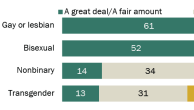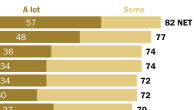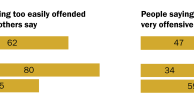by Richard Morin
Strange but true: Women score much lower on math tests if they are first asked unrelated questions about gender issues. The phenomenon is known as “stereotype threat” — a kind of performance anxiety discovered in 1995 when psychologists found that black students at Stanford University did significantly worse on intelligence tests if they were first asked to identify their race on the test form.
Since then, dozens of other experiments have confirmed that subtly cuing women, minorities and other stigmatized groups to think subconsciously about their gender or race causes them do poorly in areas where the general stereotype suggests they are weak.
University of Texas psychologist Matthew S. McGlone wondered if there wasn’t another side of the story. What if you prompted people to think about their strengths rather than their stereotypical weaknesses — would that be enough to improve performance in areas where they weren’t supposed to do well?
In a novel set of experiments, McGlone, working with Joshua Aronson of New York University, found that the answer is yes. “The idea that something is immutable due to some biological factor can be trumped,” McGlone said.
Their ingenious study involved 90 undergraduate students, half men and half women, at Lafayette College, where McGlone taught. To hide the purpose of their experiments, they told the students they were going to be asked some questions as part of a study of living conditions on the Lafayette campus.
The questionnaire was composed of two parts. All the students answered one common set of general questions about campus life. In the second section, researchers varied the questions to prime these students to think in slightly different ways.
A third of the students were asked whether they lived in a single-sex or co-ed dorm. McGlone wanted to subtly trigger “thoughts about their experiences as a gendered person on campus.” Previous studies found that even this seemingly benign question would unconsciously activate male and female stereotypes, McGlone said.
Another group answered questions about why they chose to attend a private liberal arts college. The goal was nudge these young women and men into thinking how smart and accomplished they were.
“We were activating their snob schema,” McGlone chuckled.
The control group was asked to write about their experience living in the northeastern United States.
Then the researchers engaged in a bit of scholarly deception. After the students finished the questionnaire, McGlone asked them for a favor. “‘I have a friend doing this study across the hall. Could you help us out?’” he asked. The students agreed, went to another classroom, and took Vandenberg Mental Rotation Test, a standard test of visual-spatial ability.
The items on this test consist of two-dimensional depictions of three-dimensional objects presented at various angles. Test-takers are asked to pick out the identical objects from dissimilar ones.
Studies have repeatedly found that men are far better than women at mentally rotating objects, a skill linked to math ability. The gender differences on this test are the biggest gender differences yet found on any of the various mental aptitudes that psychologists say comprise “intelligence,” McGlone and Aronson write in an article summarizing their results in a forthcoming issue of the Journal of Applied Developmental Psychology.
Then McGlone looked to see if cuing people to think about their gender, their status as college students at prestigious private school or their experiences living in the northeast had any effect on their performance on the rotation test.
It did. Among those in the control group, the tests produced a familiar result: The men did 15 to 20 percent better on the Vandenberg test than the women. And among those who had been subtly cued to think about their gender, the gap was even wider-guys did “25 percent to 30 percent better than the women.”
But the surprise came among those who were primed to think about their status as students at an exclusive private college. The gender gap closed dramatically as women’s performance improved while men’s did not change. “There was no significant difference between men and women,” McGlone reported.
The results suggest that stereotype threat can be counteracted, at least in part, by cuing people about other aspects of their lives. “With a pretty simple manipulation we could significantly reduce this gap,” he said. “There might be things that make all of these biological factors go away.”
Young and Obese
Add toddlers and babies to the growing list of overweight Americans.
Harvard researchers studied 120,680 children under the age of six and found the prevalence of overweight children jumped 59 percent between 1980 and 2001.
The number of overweight infants up to six months old also ballooned a whopping 74 percent during the 22-year study period, reported Matthew Gillman, an associate professor at Harvard Medical School.
One Way to Cure Depression
Feeling Blue? Get married.
At least that’s one way to interpret a new study by sociology graduate student Adrianne Frech and professor Kristi Williams of Ohio State University. They found that depressed single people were far more likely to benefit emotionally from marriage than better-adjusted men and women.
The researchers used data collected by the National Survey of Families and Households, which interviewed a representative sample of Americans in 1987-88 and then re-interviewed them in 1992-94. They used data from 3,066 people who were unmarried at the time of the first interview. The researchers presented their study at the recent meeting of the American Sociological Association.
Frech and Williams suggest that depressed people may benefit more from marriage because they may be in more need of emotional closeness and social support. Then again, happy people are already feeling good about themselves, so there’s not much room for improvement, Williams suggested.
Who Would Have Thought?
Sunspots and Creative Inspirations
“Correlations for number of sunspots, unemployment rate and suicide in Japan” by Akiki Otsu et al. Perceptual and Motor Skills Vol. 102. A Japanese research team headed by a Kyoto University professor of health finds that an increase in the number of sunspots is associated with a decline in unemployment and a drop in the suicide rate among Japanese men.
“Peacocks, Picasso, and Parental Investment: The effects of Romantic Motives on Creativity” by Vladas Griskevicius et al. Journal of Personality and Social Psychology Vol. 91 No. 1. A team of Arizona State University psychologists find that men performed better on tests of creativity after viewing photos of attractive women, imagining short-term liaisons or long-term relationships, but women were more creative only when they imagined devoted long-term partners.




